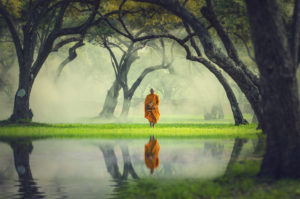
Buddhism is a religion that has shifted and changed a great deal in the thousands of years it has been around. Despite all of these changes, many concepts have lingered and remain somewhat similar. The idea of dharma, for example, has stuck around for a long time. Dharma is a concept that initially came from Hinduism, which is true of many Buddhist beliefs. In Hinduism, dharma is the force that dictates how people act when they are alone, as well as how they interact with other people and the world as a whole.
The idea of dharma in Buddhism is not too far removed from its initial Hindu roots. Still, it is more of an overlap than an exact reflection. The centuries that have passed since Hinduism first began to shape Buddhism caused the religions to change a great deal in both large and subtle ways. In order for you to fully grasp how dharma works within the confines of Buddhism, it is important to take a look at a few basic tenets surrounding it.
Dharmic Ideas
First, it is useful to take a look at dharma and what it initially meant in Hinduism. As stated, dharma was the name of the force that gives order to the universe. In other words, it is the force that helps to highlight how people interact with the world around them, as well as how other living creatures interact with one another. For early Hindus, dharma was a force that needed to be respected, as it was essentially responsible for maintaining a sense of order in the known universe. To act outside of dharma would be to throw off this balance.
Next, you may want to know about how this concept changed since becoming a part of Buddhist teachings. The biggest change between the religious movements is the way that the word is expressed. In Hinduism, dharma is an improper noun. In Buddhism, it is referred to as “the Dharma,” creating a more regal layout of the term. Since Buddhism has taken dramatically different routes over the years, it makes sense that the Dharma would have different implications depending on which form of the religion you are following.
Ultimate Truth
For some Buddhists, the Dharma is known as the “ultimate truth.” The world operates according to specific rules: rivers flow to the sea, the sun rises in the east, and so on. This is the Dharma. The natural forces that dictate the whims of the planet all act in accordance with this truth, and all humans, animals, and plants must also follow suit to help maintain a level of order in the universe. While this might seem simple enough, it is not exactly the only way that the Dharma is used throughout Buddhist teachings and beliefs.
Many Buddhists also relate the Dharma to the Buddha. Since Buddha was an enlightened person who understood more than most, the Dharma is often used to describe the teachings of the Buddha. The words of the Buddha are the Dharma, or the true teachings of the world and how it operates. While this idea will also vary depending on the exact branch of Buddhism being observed, the concept is a general foundation that most build from.
Further Reading
Dharma has been written about time and time again over the years. Outside of religious books, American authors like Jack Kerouac discovered personal connections to Buddhism and decided to write about what was discovered. Kerouac’s book “The Dharma Bums” is a semi-autobiographical work about communing with nature and understanding the Dharma in new and unusual ways.
Whether you are interested in Hinduism or Buddhism, dharma is an important concept to keep in mind. While the facts here are mainly rudimentary explanations of the concept, more in-depth discoveries can be made by taking the time to research the intricacies of this idea.

